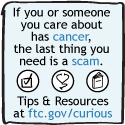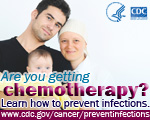Uterine Cancer Treatment
If your doctor says that you have uterine cancer, ask to be referred to a gynecologic oncologist—a doctor who has been trained to treat cancers like this. This doctor will work with you to create a treatment plan.
Types of Treatment
There are several ways to treat uterine cancer. The type of treatment a woman receives depends on the type of uterine cancer and how far it has spread. Treatments include surgery, chemotherapy, and/or radiation.
- Surgery: Doctors remove cancer tissue in an operation.
- Radiation: Radiation uses high-energy rays (similar to X-rays) to try to kill the cancer cells and stop them from spreading. The rays are aimed at the part of the body where the cancer is.
- Hormone Therapy: Hormone therapy removes hormones or blocks their action and stops cancer cells from growing. Hormones are substances made by glands in the body and circulated in the bloodstream.
- Chemotherapy: Chemotherapy involves the use of drugs to stop or slow the growth of cancer cells. Chemotherapy may cause side effects, but these often get better or go away when chemotherapy is over. Chemotherapy drugs may be given in several forms, including pills or through an IV (intravenous) injection.
Different treatments may be provided by different doctors on your medical team.
- Gynecologic oncologists are doctors who have been trained to treat cancers of a woman's reproductive system.
- Surgeons are doctors who perform operations.
- Medical oncologists are doctors who are experts in cancer and treat cancers with medicines.
- Radiation oncologists are doctors who treat cancers with radiation.
Visit the National Cancer Institute (NCI) for more information about treatments for the most common types of uterine cancer: endometrial cancer and uterine sarcoma.
Clinical Trials
If you have uterine cancer, you may want to take part in a clinical trial. Clinical trials study new treatment options to see if they are safe and effective. Visit the sites listed below for more information about clinical trials.
- NIH Clinical Research Trials and You (National Institutes of Health)
- Educational Materials About Clinical Trials (National Cancer Institute)
- Search for Clinical Trials (National Cancer Institute)
- ClinicalTrials.gov (National Institutes of Health)
Complementary and Alternative Medicine
For information, visit NCI's Complementary and Alternative Medicine. Be sure to talk to your doctor about your use of complementary and alternative medicine.

Contact Us:
- Centers for Disease Control and Prevention
Division of Cancer Prevention and Control
4770 Buford Hwy NE
MS K-64
Atlanta, GA 30341 - 800-CDC-INFO
(800-232-4636)
TTY: (888) 232-6348
8am–8pm ET
Monday–Friday
Closed on Holidays - cdcinfo@cdc.gov



